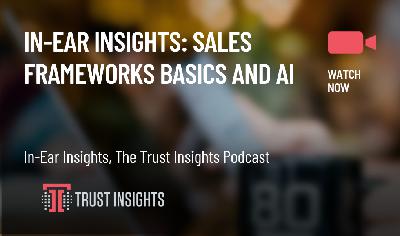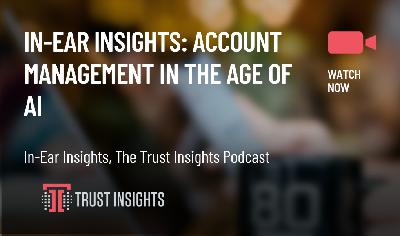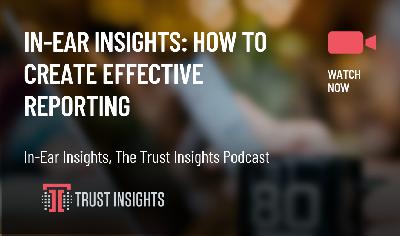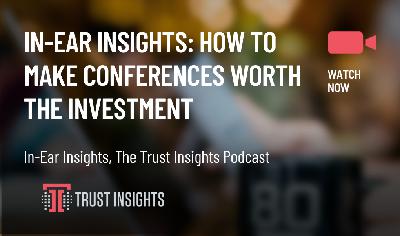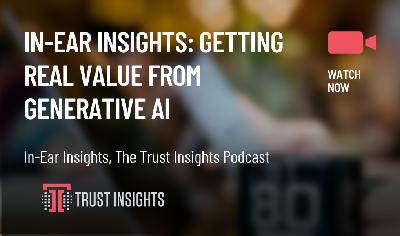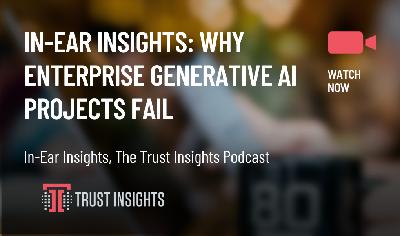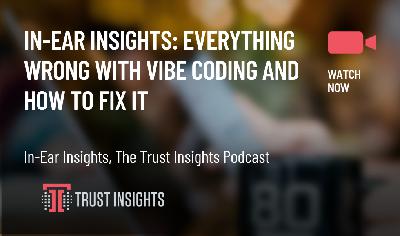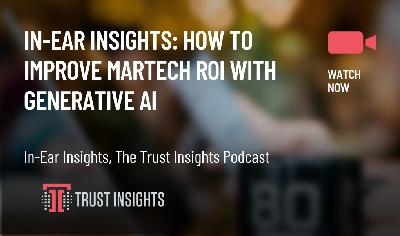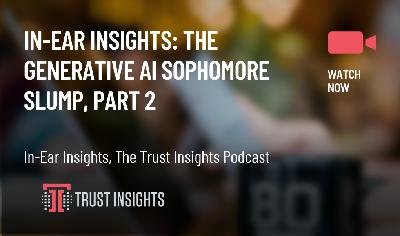In-Ear Insights: Generative AI for Marketers at MAICON 2025
Description
In this episode of In-Ear Insights, the Trust Insights podcast, Katie and Chris discuss the stark reality of the future of work presented at the Marketing AI Conference, MAICON 2025.
You’ll learn which roles artificial intelligence will consume fastest and why average employees face the highest risk of replacement. You’ll master the critical thinking and contextual skills you must develop now to transform yourself into an indispensable expert. You’ll understand how expanding your intellectual curiosity outside your specific job will unlock creative problem solving essential for survival. You’ll discover the massive global AI blind spot that US companies ignore and how this shifting landscape affects your career trajectory. Watch now to prepare your career for the age of accelerated automation!
Watch the video here:
Can’t see anything? Watch it on YouTube here.
Listen to the audio here:
https://traffic.libsyn.com/inearinsights/tipodcast-maicon-2025-generative-ai-for-marketers.mp3
- Need help with your company’s data and analytics? Let us know!
- Join our free Slack group for marketers interested in analytics!
[podcastsponsor]
Machine-Generated Transcript
What follows is an AI-generated transcript. The transcript may contain errors and is not a substitute for listening to the episode.
Christopher S. Penn – 00:00
In this week’s In Ear Insights, we are at the Marketing AI Conference, Macon 2025 in Cleveland with 1,500 of our best friends. This morning, the CEO of SmartRx, formerly the Marketing AI Institute, Paul Ritzer, was talking about the future of work. Now, before I go down a long rabbit hole, Dave, what was your immediate impressions, takeaways from Paul’s talk?
Katie Robbert – 00:23
Paul always brings this really interesting perspective because he’s very much a futurist, much like yourself, but he’s a futurist in a different way. Whereas you’re on the future of the technology, he’s focused on the future of the business and the people. And so his perspective was really, “AI is going to take your job.” If we had to underscore it, that was the bottom line: AI is going to take your job. However, how can you be smarter about it? How can you work with it instead of working against it? Obviously, he didn’t have time to get into every single individual solution.
Katie Robbert – 01:01
The goal of his keynote talk was to get us all thinking, “Oh, so if AI is going to take my job, how do I work with AI versus just continuing to fight against it so that I’m never going to get ahead?” I thought that was a really interesting way to introduce the conference as a whole, where every individual session is going to get into their soldiers.
Christopher S. Penn – 01:24
The chart that really surprised me was one of those, “Oh, he actually said the quiet part out loud.” He showed the SaaS business chart: SaaS software is $500 billion of economic value. Of course, AI companies are going, “Yeah, we want that money. We want to take all that money.” But then he brought up the labor chart, which is $12 trillion of money, and says, “This is what the AI companies really want. They want to take all $12 trillion and keep it for themselves and fire everybody,” which is the quiet part out loud. Even if they take 20% of that, that’s still, obviously, what is it, $2 trillion, give or take? When we think about what that means for human beings, that’s basically saying, “I want 20% of the workforce to be unemployed.”
Katie Robbert – 02:15
And he wasn’t shy about saying that. Unfortunately, that is the message that a lot of the larger companies are promoting right now. So the question then becomes, what does that mean for that 20%? They have to pivot. They have to learn new skills, or—the big thing, and you and I have talked about this quite a bit this year—is you really have to tap into that critical thinking. That was one of the messages that Paul was sharing in the keynote: go to school, get your liberal art degree, and focus on critical thinking. AI is going to do the rest of it.
Katie Robbert – 02:46
So when we look at the roles that are up for grabs, a lot of it was in management, a lot of it was in customer service, a lot of it was in analytics—things that already have a lot of automation around them. So why not naturally let agentic AI take over, and then you don’t need human intervention at all? So then, where does that leave the human?
Katie Robbert – 03:08
We’re the ones who have to think what’s next. One of the things that Paul did share was that the screenwriter for all of the Scorsese films was saying that ChatGPT gave me better ideas. We don’t know what those exact prompts looked like. We don’t know how much context was given. We don’t know how much background information. But if that was sue and I, his name was Paul. Paul Schrader. Yes, I forgot it for a second. If Paul Schrader can look at Paul Schrader’s work, then he’s the expert. That’s the thing that I think needed to also be underscored: Paul Schrader is the expert in Paul Schrader. Paul Schrader is the expert in screenwriting those particular genre films. Nobody else can do that.
Katie Robbert – 03:52
So Paul Schrader is the only one who could have created the contextual information for those large language models. He still has value, and he’s the one who’s going to take the ideas given by the large language models and turn them into something. The large language model might give him an idea, but he needs to be the one to flush it out, start to finish, because he’s the one who understands nuance. He’s the one who understands, “If I give this to a Leonardo DiCaprio, what is he gonna do with the role? How is he gonna think about it?” Because then you’re starting to get into all of the different complexities where no one individual ever truly works alone. You have a lot of other humans.
Katie Robbert – 04:29
I think that’s the part that we haven’t quite gotten to, is sure, generative AI can give you a lot of information, give you a lot of ideas, and do a lot of the work. But when you start incorporating more humans into a team, the nuance—it’s very discreet. It’s very hard for an AI to pick up. You still need humans to do those pieces.
Christopher S. Penn – 04:49
When you take a look, though, at something like the Tilly Norwood thing from a couple weeks ago, even there, it’s saying, “Let’s take fewer humans in there,” where you have this completely machine generated actor avatar, I guess. It was very clearly made to replace a human there because they’re saying, “This is great. They don’t have to pay union wages. The actor never calls in sick. The actor never takes a vacation. The actor’s not going to be partying at a club unless someone makes it do that.” When we look at that big chart of, “Here’s all the jobs that are up for grabs,” the $12 trillion of economic value, when you look at that, how at risk do you think your average person is?
Katie Robbert – 05:39
The key word in there is average. An average person is at risk. Because if an average person isn’t thinking about things creatively, or if they’re just saying, “Oh, this is what I have to do today, let me just do it. Let me just do the bare minimum, get through it.” Yes, that person is at risk. But someone who looks at a problem or a task that’s in front of them and thinks, “What are the five different ways that I could approach this? Let me sit down for a second, really plan it out. What am I not thinking of? What have I not asked? What’s the information I don’t have in front of me? Let me go find that”—that person is less at risk because they are able to think beyond what’s right in front of them.
Katie Robbert – 06:17
I think that is going to be harder to replace. So, for example, I do operations, I’m a CEO. I set the vision. You could theoretically give that to an AI to do. I could create CEO Katie GPT. And GPT Katie could set the vision, based on everything I know: “This is the direction that your company should go in.” What that generative AI doesn’t know is what I know—what we’ve tried, what we haven’t tried. I could give it all that information and it could still say, “Okay, it sounds like you’ve tried this.” But then it doesn’t necessarily know conversations that I’ve had with you offline about certain things. Could I give it all that information? Sure. But then now I’m introducing another person into the conversation. And as predictable as humans are, we’re unpredictable.
Katie Robbert – 07:13
So you might say, “Katie would absolutely say this to something.” And I’m going to look at it and go, “I would absolutely not say that.” We’ve actually run into that with our account manager where she’s like, “Well, this is how I thought you would respond. This is how I thought you would post something on social media.” I’m like, “Absolutely not. That doesn’t sound like me at all.” She’s like, “But that’s what the GPT gave me that is supposed to sound like you.” I’m like, “Well, it’s wrong because I’m allowed to change my mind. I’m a human.” And GPTs or large language mod

